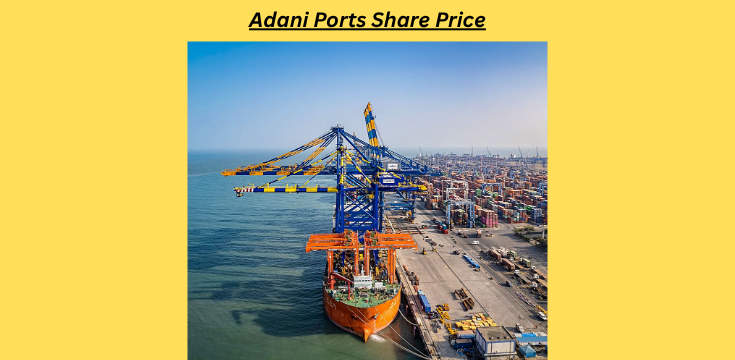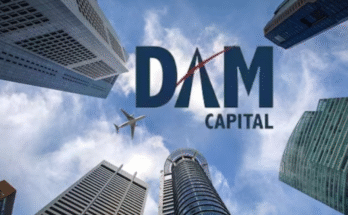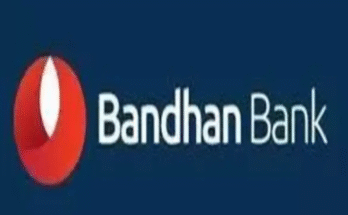Adani Ports Share Price Analysis:
Introduction:
Adani Ports and Special Economic Zone Limited (APSEZ) is India’s largest private multi-port operator and one of the key infrastructure arms of the Adani Group. The company plays a crucial role in India’s trade and logistics ecosystem, handling significant volumes of cargo through its network of ports across the country. In recent years, Adani Ports’ share price has seen both impressive rallies and sharp corrections due to various market developments, global trade dynamics, and regulatory headlines surrounding the Adani Group.
Current Share Price Performance:
As of early November 2025, the Adani Ports share price is trading around ₹1,500–₹1,510 on the National Stock Exchange (NSE) and the Bombay Stock Exchange (BSE). The stock has reached a 52-week high of ₹1,515 and a 52-week low near ₹995, indicating strong recovery momentum during the year. The market capitalisation of the company stands above ₹3.2 lakh crore, reflecting its position as one of India’s largest infrastructure firms.
In terms of valuation, the price-to-earnings (P/E) ratio of the company is around 27–28×, while the price-to-book (P/B) ratio stands close to 4.8–5×. The company maintains a modest dividend yield of about 0.46%. These figures suggest that Adani Ports is trading at a premium valuation compared to some other infrastructure stocks in India. This premium largely stems from its strong business model, consistent earnings growth, and strategic role in India’s maritime logistics network.

Business Overview:
Adani Ports and SEZ operates 13 domestic ports and terminals across India, including major locations such as Mundra, Dhamra, Krishnapatnam, Hazira, Kattupalli, and Ennore. Its flagship port, Mundra Port in Gujarat, remains India’s largest commercial port, handling massive cargo and container volumes every year.
The company’s operations cover port services, logistics, and special economic zone (SEZ) development. It has diversified its cargo mix across containers, dry bulk, liquid, and crude cargo to reduce dependency on a single segment. The company’s expansion beyond India — including investments in Sri Lanka, Israel (Haifa Port), and other regions — showcases its ambition to become a global port operator.
Financially, APSEZ has maintained robust profitability. The company has reported a return on equity (ROE) around 18%, and a return on capital employed (ROCE) near 14%. The book value per share stands around ₹310.
Click Here: https://dredgewire.com/apsez-q2-fy26-net-profit-%E2%82%B93120-cr-29-yoy-revenue-%E2%82%B99167-cr-30-yoy/
Recent Developments and Growth Drivers:
Several factors have influenced Adani Ports’ stock performance and future outlook:
Rising Cargo Volumes:
The company continues to witness steady growth in cargo volumes due to higher trade activity. India’s export and import trends are positive, driven by manufacturing, energy imports, and increasing containerisation.
Expansion and Acquisitions:
Adani Ports has been expanding aggressively through acquisitions and partnerships. It plans to develop the Wadhwan Port near Mumbai, with an estimated investment of ₹53,000 crore, which could become one of the world’s top deep-sea ports.
Government Initiatives:
The Government of India’s focus on improving port infrastructure under programs like Sagarmala and the National Logistics Policy provides a favourable policy backdrop. Improved connectivity through rail and road networks also enhances port efficiency and throughput.

Global Presence:
The acquisition of Haifa Port in Israel has made Adani Ports an international player. This move diversifies its geographic exposure but also introduces certain geopolitical risks.
Technological Integration:
APSEZ has been investing in digital technologies and automation to enhance operational efficiency, reduce turnaround time, and improve customer satisfaction.
Risks and Challenges:
While the outlook appears promising, several risks could impact the company’s future performance and share price:
Valuation Risk:
Trading at a high P/E and P/B multiple, Adani Ports’ valuation leaves limited room for disappointment. Any slowdown in earnings growth could trigger a correction.
Macroeconomic Factors:
A slowdown in global trade, geopolitical tensions, or weaker domestic demand could reduce cargo throughput, directly impacting revenue.
Debt and Interest Rate Risk:
Infrastructure businesses are capital-intensive. Higher borrowing costs or rising interest rates could affect profitability and cash flow.
Regulatory and Governance Risk:
Being part of the Adani Group, APSEZ often faces scrutiny regarding corporate governance and regulatory matters. Although the Securities and Exchange Board of India (SEBI) recently dismissed several allegations, investor sentiment can still be sensitive to such headlines.
Geopolitical Uncertainty:
Operations abroad, such as in Israel, expose the company to regional conflicts. For instance, geopolitical tensions in the Middle East earlier caused short-term pressure on the stock price.
Financial Outlook and Earnings Prospects:
Adani Ports has consistently posted revenue and profit growth over the years. Analysts project that its earnings per share (EPS) could grow at a double-digit rate over the next few years, driven by higher cargo volumes, operating leverage, and efficiency improvements.
The company’s free cash flow generation is strong, allowing it to fund expansions while maintaining balance sheet discipline. The management’s goal is to handle 1 billion tonnes of cargo annually by 2030, which, if achieved, could substantially increase revenues and profitability.
Brokerage houses remain broadly positive on Adani Ports, with an average target price of around ₹1,700–₹1,800, implying moderate upside from current levels.
Investor Perspective:
For investors, Adani Ports represents a balance of growth potential and moderate risk. The stock is suitable for those with a medium-to-long-term investment horizon who believe in India’s infrastructure development and trade expansion story. The company’s leadership in the port sector, expanding international footprint, and strong operational execution support its growth thesis.
However, short-term traders should note that the upside may be capped in the near term due to the already premium valuation. The stock could consolidate or correct if quarterly earnings miss expectations or if global trade conditions weaken.

Conclusion:
To summarise, Adani Ports and SEZ Ltd. remains one of India’s most valuable infrastructure companies, benefiting from its dominant market position, strategic assets, and strong operational performance. The current share price of around ₹1,500 reflects investor confidence in the company’s long-term growth potential.
While the premium valuation suggests optimism, it also demands consistent earnings growth to sustain momentum. For long-term investors betting on India’s trade, logistics, and infrastructure transformation, Adani Ports offers a compelling story.




